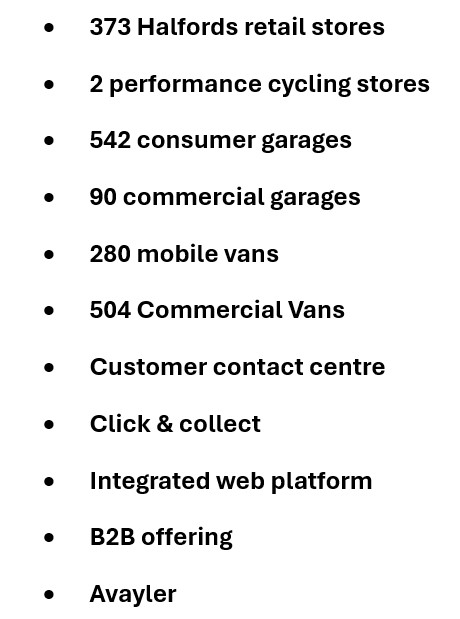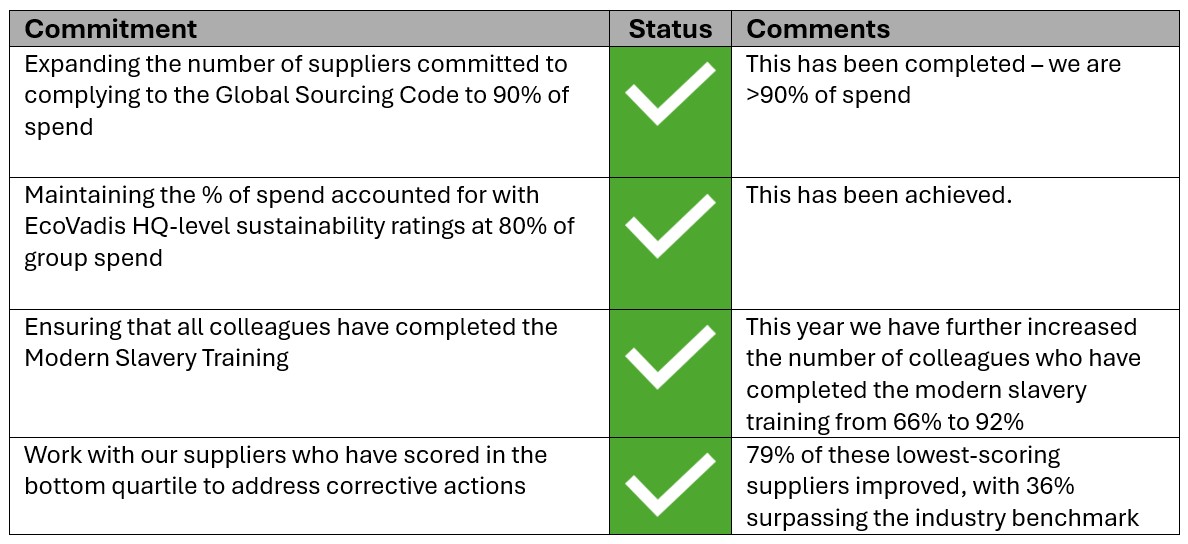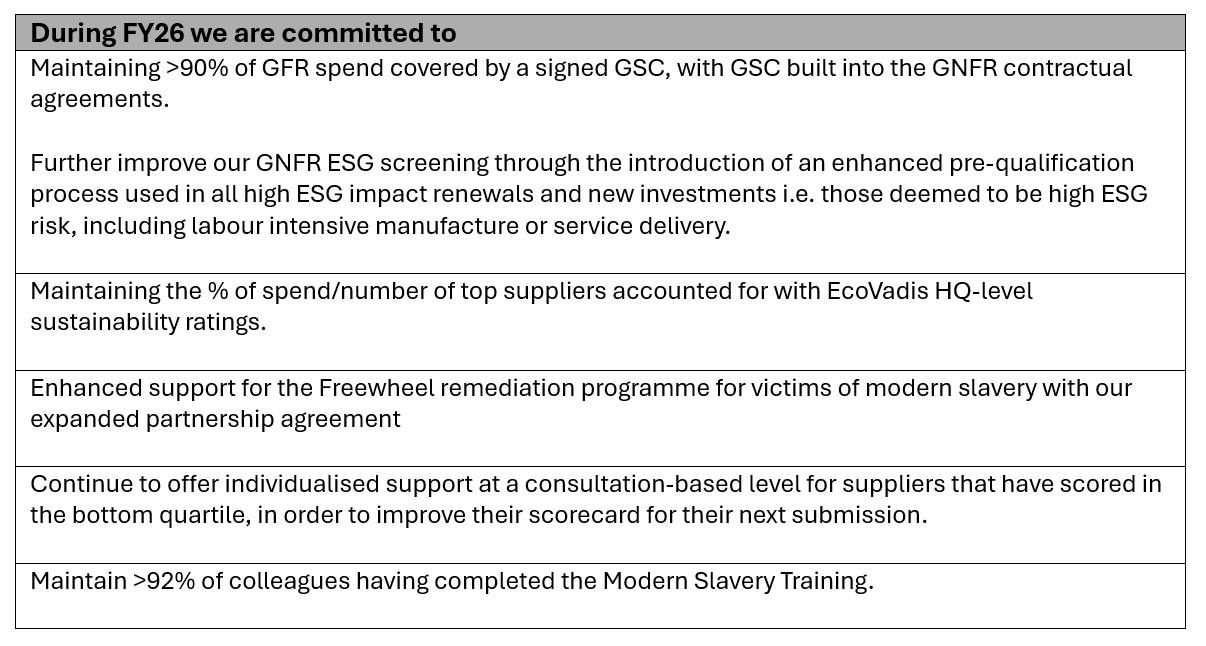We use cookies to improve your experience on this website and analyse site traffic. To find out more please review our cookie policy.

Please use the arrows to navigate to the sub pages
Introduction
This is Halfords 8th Modern Slavery statement which outlines the steps we take as a business to prevent slavery and human trafficking in our own operations and supply chains.
Previous Statements can be found on our Group website.
This statement has been published in accordance with the Modern Slavery Act 2015 (“MSA”). It sets out the steps taken by Halfords Group Plc (“Halfords”) during the financial year ended 28 March 2025 to prevent modern slavery and human trafficking in its business and supply chains.
As defined by the UK Government guidance modern slavery encompasses slavery, servitude and forced or compulsory labour; and human trafficking. Our commitment to human rights, including modern slavery extends through our Group policies and Global Sourcing Code. We recognise our responsibility in managing our business and supply chains responsibly to mitigate and remediate where necessary, the risks of modern slavery.
We acknowledge the UK Government’s release of the updated Modern Slavery Act reporting guidance and are committed to continually improving our controls and aligning more closely with its recommendations, progressively embedding the guidance across our future statements.
Our business and supply chain
We are a market-leading business, with unique and differentiated products and services. Our unique mix of stores across the UK and Ireland, garages, mobile vans and home delivery throughout the UK means we can offer customers unparalleled convenience in the motoring and cycling markets.
Halfords employs over 12,500 colleagues across the UK and Ireland.


We know that our customers want us to be there for them, when they need us. That means our stores and garages are open early and late, we offer a proposition which is mobile and comes to them wherever they are, and we offer convenient delivery options to meet their needs.
As our business continues to grow, the integration of newly acquired businesses into the Halfords Group is incredibly important to ensure consistency in our governance approach.
Our supply chain
Halfords is the UK’s leading provider of motoring and cycling products and services, operating within the retail, automotive, and leisure industries. We offer a wide range of bikes, car parts, accessories, and technology alongside MOTs, servicing, and repairs. Through our nationwide stores, garages, mobile expert vans, and online platforms, we deliver convenient and trusted solutions to meet the needs of both retail and business customers.
We have two distinct supply chains; Goods for Resale (“GFR”) and Goods Not for Resale (“GNFR”), which includes the products and services we procure for the everyday running of our business.
The GFR products we sell are sourced both directly and indirectly from a broad range of national and international suppliers. We source from countries including Taiwan, China, Cambodia, Thailand, Vietnam, Bangladesh, Tunisia, Indonesia and most of Europe. Our international supplier relationships are managed by a dedicated Halfords Global Sourcing (“HGS”) team with colleagues based in Hong Kong, Taiwan, Shanghai and the UK. We also have a near sourcing team for products sourced within Europe.
Our own-brand factories are mapped using DUNS/tax identification numbers on the EcoVadis IQ platform. This determines risk at a country and industry level to support our auditing programme.
GNFR: Goods and Services not for Resale are sourced by a Centralised Group function with expertise and experience in Sourcing across our major spend categories including; Technology, Logistics, Marketing, Property, Corporate and Professional Services. All Goods and Services undergo competitive exercise to assess the capacity, capability and quality of supply through a structured RFX process. This process includes a mandatory subset of questions which identify the overall methodology, process and ESG impacts including modern slavery risk of each bidding Supplier based on the type of goods and services to be procured. Largely GNFR goods and services are purchased from the UK however supply routes span wider EMEA, Americas and APAC for both the manufacture of goods and utilisation of near and far-shore resourcing models.
Our policies and governance
We are committed to maintaining high ethical standards within our business and supply chain We have clear policies that ensure a consistent approach to the standards of operations and behaviours we expect from our colleagues and business partners. These policies include, but are not limited to, Health and Safety Policy, Environmental Management Policy, The Group Global Sourcing Code and Data Protection Policy. The Group sources products from a large number of suppliers both with the UK and overseas. In particular, the international suppliers, managed largely by the Halfords Global Sourcing (“HGS”) team are bound contractually by the Group’s policies as detailed within the Global Sourcing Code.
In addition, we maintain policies and training that further protect our workforce and uphold ethical practices, including:
In GFR we include ESG as part of our tender processes and cover our top spending suppliers through our EcoVadis programme. Within GNFR we are proactively strengthening our Supplier shortlisting process by introducing an initial pre-qualification process for all Suppliers. This questionnaire will include questions which allow Suppliers to demonstrate their ESG methodologies and controls, including modern slavery risk.
The Environmental Social Governance (ESG) Committee comprises Non-Executive Directors and is a committee of the Board. The Committee’s remit is to ensure our ESG strategy remains effective; sets appropriate targets; and monitors progress against key targets and initiatives. The ESG Committee asked for regular updates on supply chain ethics and have remained informed of developments made throughout the year on the ongoing due diligence developments.
Responsible sourcing is a key part of our ESG strategy which includes our commitments towards reducing modern slavery. Our ESG Steering Group, which comprises of Executive Directors and Executives, is responsible for tracking the implementation of our targets and progress in this area and reports this to our Executive Team and ESG Committee respectively.
Our Global Sourcing Code (“Code”) sets out the principles that are instrumental in enabling our commercial and responsible sourcing goals. Our Code supports our commitment to respect human rights and uphold international standards, including the United Nations (“UN”) Guiding Principles on Business and Human Rights and the Organisation for Economic Cooperation and Development (“OECD”) Guidelines for Multinational Enterprises.
Our commitment to respect human rights is based on the International Bill of Human Rights consisting of the Universal Declaration of Human Rights, the International Covenant on Civil and Political Rights and the International Covenant on Economic, Social and Cultural Rights; and the International Labour Organization’s (“ILO”) Declaration on Fundamental Principles and Rights at Work.
The Code details the minimum standards to which we expect our suppliers to adhere and in turn ensures that their own business partners meet similar standards. Our Code covers expectations in the areas of environmental management, responsible sourcing of materials, safe working practices and human rights, which includes modern slavery.
We take all reasonable and practical steps, including factory and site inspections and independent audits, as required, to ensure the principles detailed in our Code are being met by our suppliers and in turn by their own business partners.
We have updated our factory auditing process to include a third-party risk assessment. With the use of EcoVadis IQ we can determine a factory’s risk level and apply the appropriate auding frequency. We cover our Tier 1 own brand factories currently with this process.
Additionally, all Suppliers of branded products must adhere to our Global Sourcing Code as part of their contractual obligations. We encourage a culture of ‘speaking up’ and expect our suppliers and their workers to do so in confidence and without fear of retaliation. Details of how to raise concerns through the AAB People (formally known as SeeHearSpeakUp) reporting channels are listed within our Global Sourcing Code.
The Group’s Whistleblowing Policy enables Halfords’ colleagues and workers within the supply chain to report concerns on matters affecting the Group or their employment, without fear of recrimination.
As part of our commitment to ensuring a culture of honesty and integrity, during FY25 we continued our partnership with AAB People in order to operate our externally operated reporting channels, including phone, email and web-based channels. We have a dedicated People Advice Hotline. We have specified inboxes for Whistleblowing and Sexual Harassment. These allow colleagues and suppliers to raise concerns or grievances.
We also have a dedicated Grievance Policy and a Global Sourcing Code.
Posters publicising whistleblowing channels are distributed regularly to all stores, Autocentres, Distribution Centres and the Support Centre as well as communicated to suppliers through our Global Sourcing Code.
This year, we have introduced a dedicated EDI Lead role who is responsible for looking after colleague related issues. We also have an extensive list of policies to ensure colleagues are treated fairly in the workplace.
Risk Management
Like many businesses with global supply chains, we consider the risk of modern slavery to be greatest in our supply chain.
Recognising that for our direct operations, the biggest risk of modern slavery is within the sourcing of ‘servicing staff’, through our GNFR procurement processes, we have begun to include detailed modern slavery questions for service staff including security and cleaning staff.
Our standard terms include conditions that explicitly reference our Global Sourcing Code, which all suppliers, both GNFR and GFR, must sign up to.
We only trade with those who comply fully with our Code and in the event of any failure to do so, we reserve the right to end the business relationship and cancel outstanding orders.
We recognise that in the event of non-compliance, withdrawal of our business may cause severe hardship to those employed. Therefore, our preference is to work with our suppliers in partnership to achieve compliance and carefully review progress made before considering severing any relationship.
During FY25, we continued our partnership with EcoVadis for sustainability scorecards. We continue to maintain over 80% of our spend accounted for via the platform and have offered individual consultation-led support to those with below average scores.
We have the additional enhancement of our third-party risk assessment tool, EcoVadis IQ. This maps a factory’s risk by country and industry, adding a further layer of credibility to our factory risk assessment process. The assigned risk drives the frequency of audit.
For GFR products we currently monitor and assess our own-brand Tier 1 supplier factories and are this year extending our risk assessments to include European and UK-based facilities. Looking ahead, we plan to broaden the scope to include Tier 2 suppliers, further strengthening transparency and ethical standards throughout our supply chain, with an initial focus on high-risk supply chains.
Due diligence
During FY25, we continued our partnership with EcoVadis, strengthening our due diligence process. We work with EcoVadis to enable our responsible sourcing programme and monitor compliance with our Code. We require suppliers to complete self-assessments through the EcoVadis platform, which helps to assess a supplier’s performance in various areas, including: ethics; environmental management; labour practices; and human rights.
The objective, independent and consistent EcoVadis scorecards offers us a window into supplier maturity, and its corrective action functionality supports in actioning identified remediation required.
The EcoVadis scorecard helps to inform our own due diligence process, highlighting good practice and where there may be greater need for auditing, remediation or corrective action. We apply a risk-based (or tiered) approach to assessing and auditing our suppliers.
For high-risk own brand suppliers, which are those operating in higher risk countries and industries, we conduct in-depth audits, including in person factory visits, confirming compliance every two years as standard, and every year for bike suppliers.
For medium/low risk own brand suppliers which are those operating in lower-risk countries and industries, we may accept an alternative (approved) audit report as a means of validating compliance, and we will accept a reduced frequency of audit.
For suppliers of proprietary branded goods for resale our standard terms include conditions to explicitly reference our Global Sourcing Code, which all suppliers must sign up to.
During the year, no modern slavery concerns were raised regarding the Group or any of its direct suppliers. It is recognised that whilst no incidents were raised (through contractual mechanisms) this does not mean issues do not potentially exist. The Company, therefore, remains committed to further enhancing its approach and understanding and enhancing its due diligence process.
We are committed to taking all modern slavery concerns extremely seriously. Any concern raised will be assessed and managed on a case-by-case basis, with actions tailored to the specific circumstances to ensure the most appropriate and effective response. This approach allows us to respond proportionately while ensuring that every concern is treated with the urgency, sensitivity, and gravity it deserves.
Stakeholder Engagement
Freewheel
We were pleased to continue our support of the Freewheel programme by Ride for Freedom with bike accessories during the year. Ride for Freedom aim to harness the universal appeal of cycling to raise awareness, educate and forge partnerships to end modern slavery and provide remedy to survivors.
Freewheel is a remediation programme that empowers survivors of modern slavery – women, children and men – to cycle to support their physical and mental health and wellbeing, independence and mobility to aid their rehabilitation into society.
Ride for Freedom operate from their hub in Barking and Dagenham. The hub supports survivors of modern slavery by providing them with a bike and bike accessories including helmets, locks and lights, alongside cycling proficiency and road awareness training through a national cycle training programme. Further information can be found on the Ride for Freedom website.
In FY26, we are expanding our partnership with Ride for Freedom, offering training videos on Modern Slavery developed by the charity itself to provide credible guidance for colleagues on identifying and responding to exploitation and supporting survivors.
Modern Slavery training and awareness
It has been a year since we launched our updated internal learning platform “The Academy”. The Modern Slavery e-learning continues to be a mandatory part of our colleague core learning curriculum. This short mandatory learning helps define the issue of modern slavery and importantly explains how to raise any potential concerns. Alongside the ‘whistleblowing hotline’, we are communicating the important role all colleagues play in being vigilant and having the confidence to speak up. Importantly, all budget holders undergo this training on induction and this is continuously reviewed as part of refresher training to ensure modern slavery risks are considered for GNFR.
As of September 2025, 92% of colleagues had completed the training module, this is much higher than the 66% reported last year. We continue to work with colleagues to raise awareness of the issue and ensure they are effectively trained and expect this number to continue to improve
2025 progress
We continue to review policies and practices to ensure our response to modern slavery remains effective, recognising this is a process of continuous improvement.
Below we detail progress made this year and our commitments for the next year.


This statement was approved by our Board of Directors on 25 September 2025 and will be reviewed on an annual basis.

Henry Birch
Chief Executive Officer